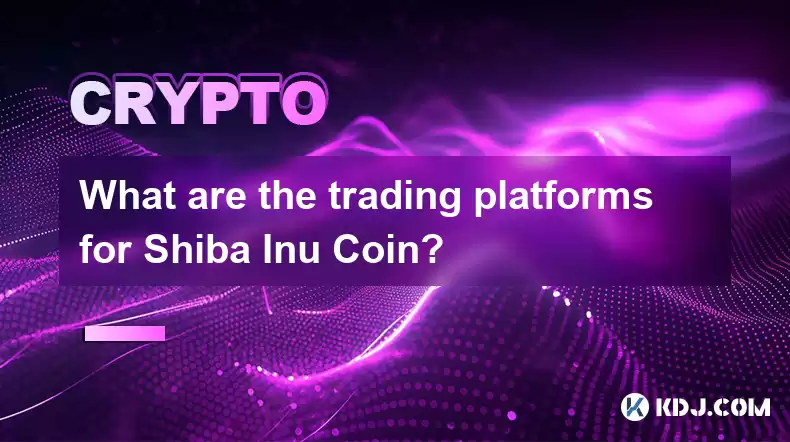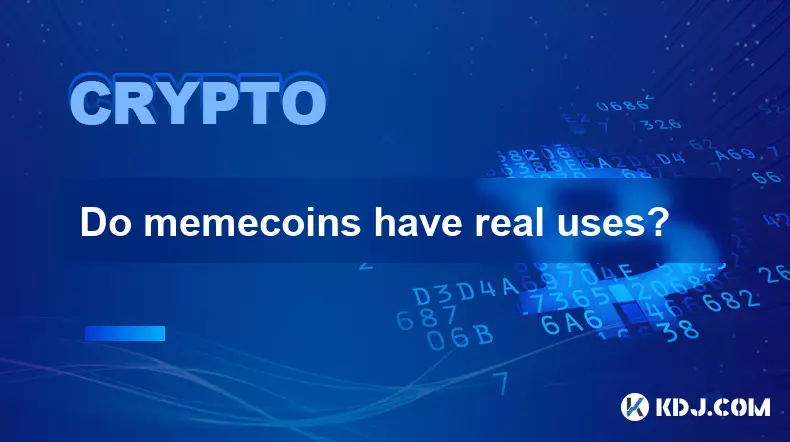-
 bitcoin
bitcoin $87959.907984 USD
1.34% -
 ethereum
ethereum $2920.497338 USD
3.04% -
 tether
tether $0.999775 USD
0.00% -
 xrp
xrp $2.237324 USD
8.12% -
 bnb
bnb $860.243768 USD
0.90% -
 solana
solana $138.089498 USD
5.43% -
 usd-coin
usd-coin $0.999807 USD
0.01% -
 tron
tron $0.272801 USD
-1.53% -
 dogecoin
dogecoin $0.150904 USD
2.96% -
 cardano
cardano $0.421635 USD
1.97% -
 hyperliquid
hyperliquid $32.152445 USD
2.23% -
 bitcoin-cash
bitcoin-cash $533.301069 USD
-1.94% -
 chainlink
chainlink $12.953417 USD
2.68% -
 unus-sed-leo
unus-sed-leo $9.535951 USD
0.73% -
 zcash
zcash $521.483386 USD
-2.87%
What are the trading platforms for Shiba Inu Coin?
Shiba Inu (SHIB) trades on various centralized (CEXs) and decentralized (DEXs) exchanges. Security, fees, and user experience differ; research platforms like Binance, Coinbase, Uniswap, and ShibaSwap before investing, prioritizing reputable options and robust security measures.
Mar 18, 2025 at 02:19 pm

- Shiba Inu Coin (SHIB) is traded on a variety of centralized and decentralized exchanges (CEXs and DEXs).
- Choosing a platform depends on factors like fees, security, available trading pairs, and personal preference.
- Security considerations are paramount when selecting a trading platform for any cryptocurrency.
- Understanding the differences between CEXs and DEXs is crucial for informed trading decisions.
- Always research and verify the legitimacy of any platform before depositing funds.
Shiba Inu Coin (SHIB), a meme-inspired cryptocurrency, has gained significant popularity, leading to its listing on numerous trading platforms. These platforms can be broadly categorized as centralized exchanges (CEXs) and decentralized exchanges (DEXs). Each offers a different trading experience and carries unique risks and benefits.
Centralized Exchanges (CEXs):CEXs are traditional exchanges where a third-party holds custody of your funds. They generally offer a user-friendly interface and a wider range of trading pairs. However, this centralized control introduces risks associated with security breaches and platform insolvency. Popular CEXs listing SHIB include Binance, Coinbase, Kraken, and KuCoin. Each platform has its own fee structure, security protocols, and user experience. It's crucial to research each before choosing one.
Binance, for example, is known for its high trading volume and diverse range of cryptocurrencies, including SHIB. However, it's subject to regulatory scrutiny in some regions. Coinbase, prioritizing user-friendliness, is often preferred by beginners. Kraken and KuCoin also offer SHIB trading, each with its unique strengths and weaknesses regarding fees and available features.
Choosing the "best" CEX is subjective. Factors such as location, trading fees, security measures, and user interface all contribute to the decision-making process. It's recommended to compare multiple CEXs before committing your funds. Thorough research is crucial to mitigate potential risks.
Decentralized Exchanges (DEXs):DEXs operate differently. They don't hold custody of your funds; instead, you retain control of your private keys. This offers enhanced security, but the user experience can be more technically challenging. Popular DEXs supporting SHIB include Uniswap, ShibaSwap (a DEX specifically designed for SHIB and related tokens), and others built on various blockchain networks.
Using a DEX like Uniswap requires understanding concepts like liquidity pools and decentralized finance (DeFi). You'll interact directly with smart contracts, making it crucial to double-check addresses and transaction details to prevent errors. ShibaSwap, being SHIB-centric, offers a more streamlined experience for those focused specifically on the Shiba Inu ecosystem. However, liquidity on DEXs can be lower compared to CEXs, potentially impacting order execution speed and slippage.
The choice between a CEX and a DEX depends on your risk tolerance and technical expertise. CEXs provide convenience and ease of use, while DEXs offer greater control and security but require a higher level of technical understanding.
Security Considerations:Regardless of the chosen platform, security is paramount. Always prioritize reputable exchanges with a proven track record and robust security measures. Be wary of phishing scams and avoid sharing your private keys with anyone. Utilize two-factor authentication (2FA) wherever possible to enhance account security.
Enable strong passwords and consider using a hardware wallet for enhanced security, especially for larger holdings. Regularly review your account activity for any suspicious transactions. Staying informed about security best practices is essential to protect your investment.
- Two-factor authentication (2FA): Enable this feature on all your exchange accounts.
- Strong passwords: Create complex, unique passwords for each platform.
- Hardware wallet: Consider using a hardware wallet for added security.
- Regular account reviews: Check your account activity frequently for suspicious transactions.
A: No platform is entirely risk-free. CEXs are susceptible to hacking and insolvency, while DEXs carry risks associated with smart contract vulnerabilities and potential scams. Diligent research and the implementation of robust security practices are crucial.
Q: What are the fees associated with trading SHIB?A: Fees vary significantly between platforms and depend on factors like trading volume, transaction speed, and the specific trading pair. Each platform publishes its fee schedule, which should be carefully reviewed before trading.
Q: Are there any regulatory considerations for trading SHIB?A: The regulatory landscape for cryptocurrencies is constantly evolving. Regulations vary by jurisdiction, and it's crucial to be aware of the applicable laws in your region before engaging in SHIB trading.
Q: Which platform is best for beginners?A: For beginners, user-friendly CEXs like Coinbase are often recommended due to their intuitive interfaces and robust security measures. However, understanding the risks associated with any platform is crucial regardless of experience level.
Q: How do I choose the right trading platform for me?A: Consider factors such as fees, security, user interface, available trading pairs, and your level of technical expertise. Compare multiple platforms before making a decision and prioritize security above all else.
Disclaimer:info@kdj.com
The information provided is not trading advice. kdj.com does not assume any responsibility for any investments made based on the information provided in this article. Cryptocurrencies are highly volatile and it is highly recommended that you invest with caution after thorough research!
If you believe that the content used on this website infringes your copyright, please contact us immediately (info@kdj.com) and we will delete it promptly.
- UAE Investor Secures Major Stake in Trump-Linked Crypto Firm Amidst Shifting Geopolitical Tides
- 2026-02-02 07:10:01
- Pepe Meme Coin: Navigating the Hype, Price Predictions, and Future Outlook in 2026 and Beyond
- 2026-02-02 07:05:01
- Blockchain Gaming's Quiet Revolution: Unpacking Latest Trends and Industry Insights Amidst Market Shifts
- 2026-02-02 06:30:01
- IPO Genie, Tokenization, and YouTubers: The Big Apple's Next Big Bet on Democratized Wealth
- 2026-02-02 06:40:02
- Aptos in a Bind: Downtrend Deepens, But a Brief Relief Bounce Looms Before the Next Plunge
- 2026-02-02 07:00:01
- Pi Network, ATL, and Community: Navigating the Currents of a Mobile-First Crypto Movement
- 2026-02-02 07:00:01
Related knowledge

What is a memecoin and is it a serious investment?
Nov 30,2025 at 01:20am
Understanding the Nature of Memecoins1. Memecoins are digital assets inspired by internet jokes, viral trends, or pop culture references rather than t...

What are meme coins and are they a good investment?
Oct 16,2025 at 03:54pm
What Are Meme Coins?1. Meme coins are digital currencies inspired by internet jokes, viral trends, or social media culture. They often originate as pa...

What is the relationship between "Shiba Inu" and "Dogecoin"?
Sep 19,2025 at 08:36pm
Origins and Inspiration Behind Shiba Inu and Dogecoin1. Dogecoin was created in 2013 by software engineers Billy Markus and Jackson Palmer as a lighth...

How was "Bitcoincoin" originally created?
Sep 17,2025 at 07:18pm
Origins of Dogecoin in the Cryptocurrency Landscape1. Dogecoin was introduced to the digital currency world in December 2013 by software engineers Bil...

Do memecoins have real uses?
Sep 19,2025 at 03:54am
Understanding the Role of Memecoins in the Crypto Ecosystem1. Memecoins originated as internet joke currencies, often inspired by viral memes or pop c...

Where can I buy memecoins?
Sep 18,2025 at 02:18pm
Popular Platforms for Acquiring Memecoins1. Centralized exchanges like Binance, OKX, and Bybit have become primary destinations for traders seeking ne...

What is a memecoin and is it a serious investment?
Nov 30,2025 at 01:20am
Understanding the Nature of Memecoins1. Memecoins are digital assets inspired by internet jokes, viral trends, or pop culture references rather than t...

What are meme coins and are they a good investment?
Oct 16,2025 at 03:54pm
What Are Meme Coins?1. Meme coins are digital currencies inspired by internet jokes, viral trends, or social media culture. They often originate as pa...

What is the relationship between "Shiba Inu" and "Dogecoin"?
Sep 19,2025 at 08:36pm
Origins and Inspiration Behind Shiba Inu and Dogecoin1. Dogecoin was created in 2013 by software engineers Billy Markus and Jackson Palmer as a lighth...

How was "Bitcoincoin" originally created?
Sep 17,2025 at 07:18pm
Origins of Dogecoin in the Cryptocurrency Landscape1. Dogecoin was introduced to the digital currency world in December 2013 by software engineers Bil...

Do memecoins have real uses?
Sep 19,2025 at 03:54am
Understanding the Role of Memecoins in the Crypto Ecosystem1. Memecoins originated as internet joke currencies, often inspired by viral memes or pop c...

Where can I buy memecoins?
Sep 18,2025 at 02:18pm
Popular Platforms for Acquiring Memecoins1. Centralized exchanges like Binance, OKX, and Bybit have become primary destinations for traders seeking ne...
See all articles










































































